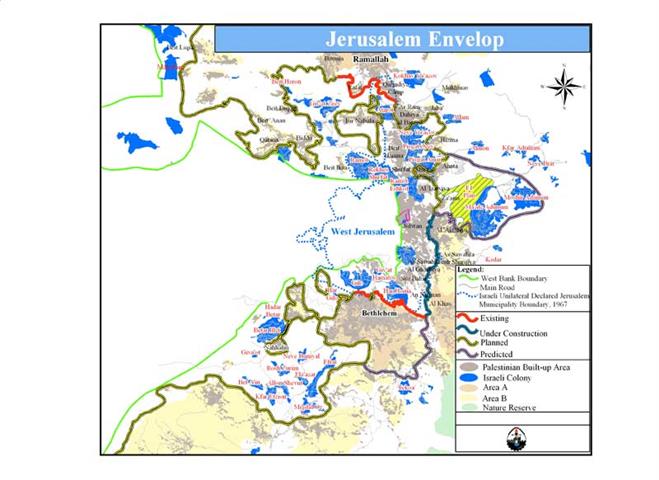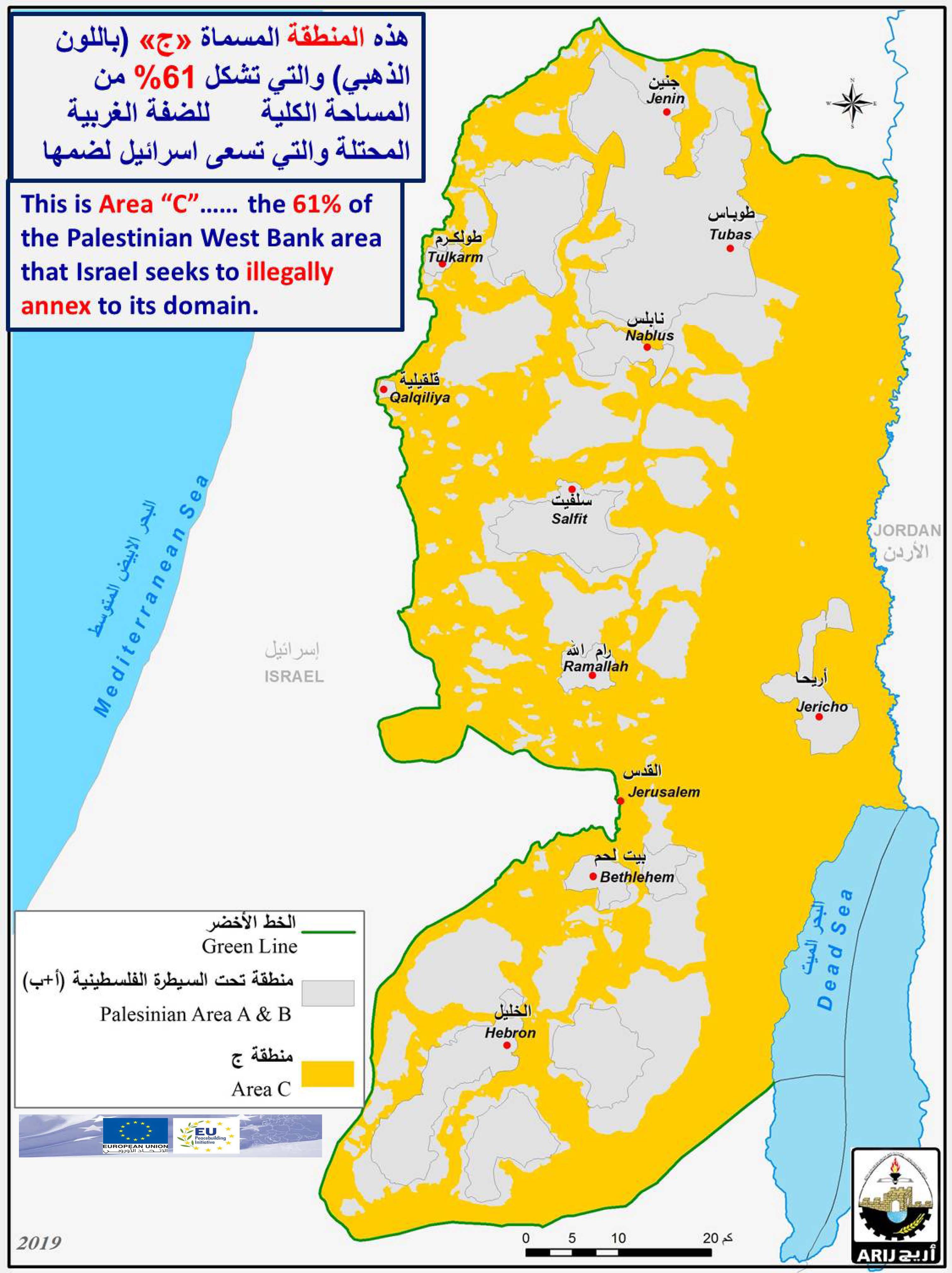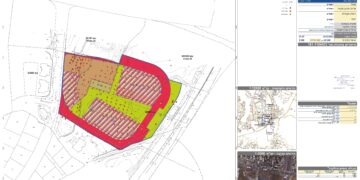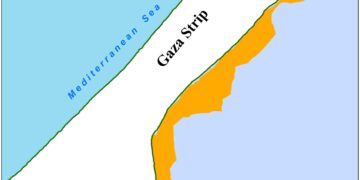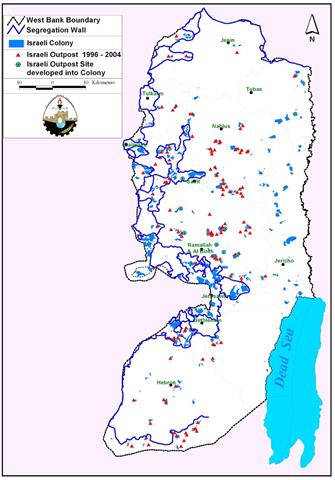The decision of the Israeli cabinet (June 2004) to adopt the Absentee property law in East Jerusalem came to close the chapter on the remaining Palestinian lands that were not appropriated over the past 38 years of Israeli occupation of the city. Some sources estimates that the implantation of the Absentee property law in East Jerusalem will result in the appropriation of thousands of Dunums while others have said that half of the city's property will be gone upon activating this law. Residents of the West Bank owning property located within the illegally set Israeli boundaries of East Jerusalem are the victims of this law. West Bankers' living in Beit Jala, Bethlehem and Al-Walaja (not residents of Jerusalem); along the south and southwestern boundaries of Jerusalem are the most likely to be encountered by the Absentee property law which is activated at this particular time as a direct result of the on-going Segregating Wall Israel is building around Jerusalem. The new law identifies the owners of the threatened lands as absentee even though they live in proximity of their lands. See Map 1 & Map 2.
Map 1 : Jerusalem Envelop
Map 2 : Israeli illegal expansion of Jerusalem borders after 1967
The Israeli policies and practices in the occupied Palestinian territories has infamously escalated particularly during the past 4+ years of the Intifada were degradation of morality and legal aspects has reached unprecedented level; even for the Israelis. The Israeli policies and laws have contradicted humanitarian ethics and defiantly breached most of the fundamental international principles of both humanitarian and conventional. In spite of the various, peace accords signed between the Palestinian Liberation Organization (PLO); being the legitimate representative of the Palestinian people and Israel, the latter maintained a steady pace in its policy to grab more Palestinian lands and establish illegal colonial settlements to accommodate Israeli settlers in them. Furthermore, Israel regarded the settlements as a part of their God given rights in this land and as their first line of defense against any probable attack from the neighboring Arab countries.
Israeli Illegal annexation of Palestinian Territories
Sovereignty of the occupation power over the occupied territories is a dismissed concept by the international law of armed conflict. The authority practiced by the occupation does not consent it a domination over the land it occupy and certainly does not allow the occupation to annex any part of the land to its jurisdiction nor transfer parts of its population to the territory it occupy. The consecutive Israeli governments adopted a policy to acquire much of the West Bank lands to build and expand the Israeli settlements by employing different methods; most recognized of which, 'Security', which is also how Israel was able to restrict Palestinian towns' development on the remaining areas.
Different Israeli Procedures to Acquire Palestinian lands
Even though all the consecutive Israeli governments adopted the settlement policy in the occupied Palestinian territories, each had a different approach to realize their shared objective and that to maintain the settlement program constantly active. The following methods employed by Israel over the years for the acquisition of Palestinian lands for the Israeli settlements.
1. Acquisition by Declaring 'State Land'
When Israel occupied the West Bank in 1967, only one third of the land was registered to the people while the remaining two thirds of land ownership was proven by a Turkish issued Tabo (certificate of ownership) and an official British certificate/ registration. Purchase and/ or registrations of land made under Jordanian law prior to 1967 are also valid deed of land ownership. Fundamentally, the Ottoman land code (law) continue to govern the land holdings in the West Bank even with amendments passed during the Jordanian rule and the Israeli military orders issued since the 1967 occupation. The Ottoman land code had three main categories to classify the lands:
A) Waqf Land: Lands owned by religious bodies.
B) Mulk & Khuraj Lands: Mulk lands assigned by the Ottoman rule of the area which perceived itself as the ultimate owner by the fact of conquest to all occupied lands; to Muslim residents of the occupied area while the Khuraj lands assigned to non-Muslim residents.
C) Miri/ Matruk & Mawat Lands: These lands were all unregistered and considered by Israel as a State property and they cover the majority of the lands. The Miri lands are those, which belonged to Al-Amir or the Prince of the county and were not dedicated to any segment of the society. The Matruk lands were those lands dedicated to public usage (lands, building, etc) as for the Mawat lands; it indicated the lands remotely located from urban areas.
The objection committee is the only authority entitle to question the declaration of lands classified as ''State Lands'' and since it is controlled and administered by the Israeli military it had been impossible to alter any declaration which is made in the first place by the same source. The Israeli high court has also distant itself from the issue after its infamous ruling on the Elon Moreh case that constituted an official outbreak of the settlement program in 1979 by declaring that it will not intervene in any lands disputes unless the land in subject of seizure is privately owned. The Israeli military has arranged to acquire Palestinian lands for the Israeli settlements and controlled all procedures to cast off the objection appeals made by the Palestinian residents against any acquisition order, which paved the way for the Israeli Army to acquire hundreds of thousands of Dunums of Palestinian lands following the 1967 occupation.
The acquisition declaration come in a form of Israeli Ministerial decision to build a new settlement or expand existing one or to construct a bypass road that serve the interest of the Israeli settlers. The Israeli Ministry of Justice then reviews the decision for the declaration before it passes to Israel Land Authority (ILA) and to the Office of the Custodian of Absentee and State Lands for further review. Afterward the decision is mete out to the residents who wishes to appeal the declaration decision before the military Objection Committee.
The objection committee requires that each landowner submit a survey map of the targeted area, which usually exceeds 2000 Dunums, a sworn statement of ownership and all relative documents to prove an ownership, all within 30 days of the declaration. However, the objection committee will not acknowledge receipts for payment of tax on the land or registration in the tax department as permissible attestation of ownership. Land cultivation for 10 consecutive years (Ottoman Land Code) prior to the declaration is the basis of ownership the objection committee requires the appellant to submit as a proof of ownership. In most of the cases, the custodian has available proof (aerial photos provided by the military) that the targeted lands have not been periodically cultivated. On the other hand, the Israeli Authorities have always denied the Palestinian farmers the right to drill artesian wells that made them (the farmers) more dependent on the uncertain rain-fed cultivation.
The appeal process is a Byzantine and excessively expense one since the objection committee which the israeli military administer; (the party responsible for the declaration in the first place) is the rival of the appellant which makes the anticipated tribunal decision in favor of the Israeli State not only a certainty but an additional legal aspect to the declaration and make it constitutive. Even if for some reason, a Palestinian appellant was able to proof all required documents and verifications of land ownership, the objection committee will still rule in favor of the Israeli custodian based on Israeli tailored rules to counter such remote scenario. The following box includes the Israeli military order, which entitled the custodian of the Israeli government to appropriate any land in the occupied territories after 1967; it also shows the amendment of the order in 1984.
MILITARY ORDERS ALLOWING GOVERNMENT CONFISCATION OF PRIVATELY OWNED LAND & PROPERTY:
Military Order #59 (1967?) – establishes the Israeli Military-appointed position of 'Custodian of Government Property' to take over land owned by the Jordanian Government. Also, allows the 'Custodian of Government Property' to appropriate land from individuals or groups by declaring it 'Public Land' or 'State Land', the latter which it defines as land that was owned or managed by, or had a partner who was an enemy body or citizen of an enemy country during the 1967 war (amended by M.O.1091).
LAW TYPE: MILITARY ORDER
LAW NUMBER: 364
DATE: 29 December 1969
LAW NAME: ORDER CONCERNING STATE PROPERTY
AMENDS: Military Order 59
by declaring that Israeli Military can appropriate land simply by declaring it 'State Lands' (according to previous definitions).
LAW TYPE: MILITARY ORDER
LAW NUMBER: 1091
DATE: 20 January 1984
LAW NAME: ORDER CONCERNING STATE PROPERTY
AMENDS: Military Order 59
LAW SUMMARY: 'State property' is now interpreted as including any property subject to an expropriation order. It is defined as: 1. 'Property that on the date of occupation or afterwards was registered in the name of an enemy state, or any organization or company linked or controlled directly or indirectly by a hostile state'. 2. 'Land that has been confiscated in the public interest in accordance with legislation or security legislation through or for one of the sectors/ authorities of the Israeli military forces which is not necessarily local'. 3.' All property which belongs to individuals who have requested that the official authorities administers and manages their properties, and which the official has consented to administer.'
2. Acquisition by Declaring 'Abandoned Land'
A military order passed in 1967 by the Israeli military commander of the West Bank; military order 58 to define absentee as someone who has left the area of the West Bank before, during or after the time of the 1967 war.
MILITARY ORDERS ALLOWING GOVERNMENT CONFISCATION OF PRIVATELY OWNED LAND & PROPERTY:
Military Order #58 (1967) – gives control of absentee land to Israeli military. Defines absentee as someone who left Israel before, during, or after the 1967 war. Allows Israeli Military to keep property even if the property was taken by mistake due to a misjudgment (that it was abandoned for example).
As Israel control over the land registers became absolute following the 1967 war, they were able to classify which lands maybe categorized as abandoned ''absentee'' property. However, that did not safeguard the Palestinian properties of individuals who did not leave the area before, during or after the 1967 war and whose property does not qualify as abandoned ''absentee'' property. The Israeli custodian may still take possession of the land for any purpose (mainly to build or expand settlements) and turn over the ownership to individuals or companies and if the owner of the land object, the custodian would invoke military order 58 (above) and article 17 of the Absentee property law of 1950 (below) which would allow the Israeli military to keep the property in any case.
ABSENTEES' PROPERTY LAW, 1950
Art.17. Any transaction made in good faith between the Custodian and another person in respect of property which the Custodian considered at the time of the transaction to be vested property shall not be invalidated and shall remain in force even if it is proved that the property was not at the time vested property.
3. Acquisition by Declaring 'Lands for Military Purposes'
Following the 1967 war, the Israeli Army issued loads of military orders that entitled the Israeli Army to seize under security pretext privately owned Palestinian lands. The military orders usually bear the following clause:
According to my jurisdictions as Military Chief Commander in the Region of Judea and Samaria, and as I believe that it is imperative for military purposes, I order the following..
Figuratively the acquired land remain under private ownership, but literally the land will remain under the military control indefinitely in-fact, the Israeli Army would later on turn the seized lands to Israeli settlers to build new settlements or expand existing ones.
4. Acquisition by Declaring 'Closed Military Zones'
The israeli Military occupation has issued many unnumbered military orders declaring certain areas of the West Bank as ''closed military zones'' under which Palestinian's movement and that of unwelcome visitors (reporters) into these certain areas is restricted. The Israeli military occupation often attributed the closed areas are used as a training ground for the Army, including firing ranges. However, considerable parts of these areas would turn later on to the Israeli settler's benefits such as the case of Kiryat Arba settlement (established 1972) in the heart of Palestinian city Hebron.
5. Acquisition by Declaring 'Expropriation for Public Services' under Military Order 321
MILITARY ORDERS ALLOWING GOVERNMENT CONFISCATION OF PRIVATELY OWNED LAND & PROPERTY:
Military Order #321 (1969) – gave Israeli Military right to confiscate Palestinian land in name of 'Public Service' (left undefined), and without compensation.
The Israeli Army used the expropriation law to construct main roads for military use and to construct bypass roads that are distant from Palestinian towns and villages for the Israeli settlers while traveling in the occupied territories. This acquisition procedure was adapted by the israeli Army after a Jordanian law (law#2: Expropriation for public purposes of 1953) which entitled government Authority to appropriate land for public benefit only after a declaration of such intention is published in the official Gazette with specified details. The Jordanian law would also allow 15 days for objection before expropriation claim resubmitted for final approval from the council of ministries and the King. Furthermore, the government would fully compensate the landowners for in accordance to the market value on the date of the expropriation.
Israel sought to inflict amendments to the Jordanian expropriation law to make it less obvious with virtually non-requiring approval from any official authority other than the military institution. The amendments also intended to cast off jurisdictions of local courts to review the expropriation or order compensations to the damaged parties. The objection committee is the only authorized party to review any complaints made by the landowners who are sure that they will not find any justice among the military personnel that form the objection committee. The following most notable amendments over the Jordanian expropriation law are:
-
The right to employ the expropriation law under the Jordanian rule was only within the jurisdiction of the Jordanian government, while the Israeli high commander of the occupied territories appointed a military authority to carry out this law.
-
In the amendments made under Israeli Military Order 569, the military authority appointed by the Israeli high commander of the occupied territories no longer obligated to make any declaration of intent neither to expropriate any land nor to obtain an approval other than that of the Israeli high commander of the occupied territories.
LAW TYPE: MILITARY ORDER
LAW NUMBER: 569
DATE: 17 December 1974
LAW NAME: ORDER CONCERNING STATE PROPERTY
Created a Dept. of Special Land Transactions where registration of lands declared to be 'state lands', or lands appropriated for security reasons occurs. Public notice of these transactions limited to notices posted within this office instead of newspapers.
-
The objection committee, which originates from military personnel, is the only party entitled to review any appeal made by the landowners for the expropriation or to determine any compensations if there is any.
-
The Israelis went further by adding the use of force against those who may resist the Israeli military control over the land in addition to imposing severe punishment that includes 5 years imprisonment or excessive fine or both.
The status of Israel presence in the occupied Palestinian territories (the West Bank & Gaza) is acknowledged as an occupying power by the international law and community which acknowledge in their turn the occupying power (Israel) under the Hague regulations 1907 as an administrator of State property.
The box below shows a set of articles of Hague regulations that indicates the extent of jurisdiction of the occupying power over the occupied territories; particularly article 55.
SECTION III: MILITARY AUTHORITY OVER THE TERRITORY
OF THE HOSTILE STATE
Article 23: To destroy or seize the enemy's property, unless such destruction or seizure be imperatively demanded by the necessities of war;
Article 46.: Private property cannot be confiscated.
Article 55: The occupying State shall be regarded only as administrator and usufructuary of public buildings, real estate, forests, and agricultural estates belonging to the hostile State, and situated in the occupied country. It must safeguard the capital of these properties, and administer them in accordance with the rules of usufruct.
Article 56: The property of municipalities, that of institutions dedicated to religion, charity and education, the arts and sciences, even when State property, shall be treated as private property.
Evidently, Israel intention was never to seize the absentee property in trust in accordance with the rules of usufruct as stated in article 55 above as the custodian entrusted to the property illicitly transferred exploitation rights to third parties in permanent status. This comes to collaborate and carry on Zionist intentions to appropriate the territories under Israeli military occupation as inscribed in the World Zionist Organization's 'Master Plan for the Development and Settlement in Judea and Samaria, 1979-1983,' also known as the 'Drobles Plan' for its author.
Over the past 50+ years, Israel sought to conquer the Palestinian territories without its inhabitants and for that, it machinated to evict the native Palestinian inhabitants from the land. Israel manipulated the legislation with regard to the 'legal' condition of absenteeism in order to confiscate privately owned Palestinian land under the 1948 Absentee Property Law and assign it to Israeli settlers. Furthermore, Israel made sure to deplete the economy in the occupied territories especially within the agricultural sector, which use to comprise more than 60% of the Palestinian economy and 70% of the workforce at one time thus pushing the people out of the land.
Israel has strategically implanted hundreds of illegal settlements within the occupied territories, isolating in the process the Palestinian communities from each other. These Israeli settlements has also served an Israeli military purpose as stated in the Drobles plan which clearly cite the settlements as the first line of defense against any possible aggression against the State of Israel. 'Settlement throughout the entire Land of Israel is for security and by right. A strip of settlements at strategic sites enhances both internal and external security alike, as well as making concrete and realizing our right to Eretz Israel'. 'Master Plan for the Development and Settlement in Judea and Samaria, 1979–1983,'
Following the Camp David Accords signed between Israel and Egypt in 1978, Israel accelerated the pace on the building of settlements in the occupied territories, which later on proved to be landmines masterly planed and implanted, by the State of Israel and the World Zionist Movement aiming to create facts on the ground and eclipse the Palestinian dream of self-determination and independence viable State. Now the notion of implanting the Absentee property law on occupied East Jerusalem largely violates the Oslo Accord that stipulates upon the involved parties of the accord not to take any steps that might change the status of issues of the final status agreement, which questions Israel's intention of concluding a peace agreement with the Palestinians.
Prepared by:
The Applied Research Institute – Jerusalem


